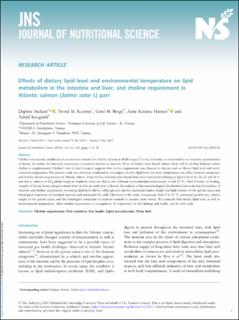| dc.contributor.author | Siciliani, Daphne | |
| dc.contributor.author | Kortner, Trond M. | |
| dc.contributor.author | Berge, Gerd Marit | |
| dc.contributor.author | Hansen, Anne Kristine Grostøl | |
| dc.contributor.author | Krogdahl, Åshild | |
| dc.date.accessioned | 2023-07-17T10:48:48Z | |
| dc.date.available | 2023-07-17T10:48:48Z | |
| dc.date.created | 2023-06-15T18:54:52Z | |
| dc.date.issued | 2023 | |
| dc.identifier.citation | Journal of Nutritional Science (JNS). 2023, 12 . | |
| dc.identifier.issn | 2048-6790 | |
| dc.identifier.uri | https://hdl.handle.net/11250/3079618 | |
| dc.description.abstract | Choline was recently established as an essential nutrient for Atlantic salmon at all life stages. Choline deficiency is manifested as an excessive accumulation of dietary fat within the intestinal enterocytes, a condition known as steatosis. Most of today's plant-based salmon feeds will be choline-deficient unless choline is supplemented. Choline's role in lipid transport suggests that choline requirement may depend on factors such as dietary lipid level and environmental temperature. The present study was therefore conducted to investigate whether lipid level and water temperature can affect steatosis symptoms, and thereby choline requirement in Atlantic salmon. Four choline-deficient plant-based diets were formulated differing in lipid level of 16, 20, 25 and 28 % and fed to salmon of 25 g initial weight in duplicate tanks per diet at two different environmental temperatures: 8 and 15 °C. After 8 weeks of feeding, samples of blood, tissue and gut content from six fish per tank were collected, for analyses of histomorphological, biochemical and molecular biomarkers of steatosis and choline requirement. Increasing lipid level did not affect growth rate but increased relative weight and lipid content of the pyloric caeca and histological symptoms of intestinal steatosis and decreased fish yield. Elevation of the water temperature from 8 to 15 °C, increased growth rate, relative weight of the pyloric caeca, and the histological symptoms of steatosis seemed to become more severe. We conclude that dietary lipid level, as well as environmental temperature, affect choline requirement to a magnitude of importance for fish biology and health, and for fish yield. | |
| dc.language.iso | eng | |
| dc.title | Effects of dietary lipid level and environmental temperature on lipid metabolism in the intestine and liver, and choline requirement in Atlantic salmon (Salmo salar L) parr | |
| dc.title.alternative | Effects of dietary lipid level and environmental temperature on lipid metabolism in the intestine and liver, and choline requirement in Atlantic salmon (Salmo salar L) parr | |
| dc.type | Peer reviewed | |
| dc.type | Journal article | |
| dc.description.version | publishedVersion | |
| dc.source.pagenumber | 0 | |
| dc.source.volume | 12 | |
| dc.source.journal | Journal of Nutritional Science (JNS) | |
| dc.identifier.doi | 10.1017/jns.2023.45 | |
| dc.identifier.cristin | 2155083 | |
| cristin.ispublished | true | |
| cristin.fulltext | original | |
| cristin.qualitycode | 1 | |
